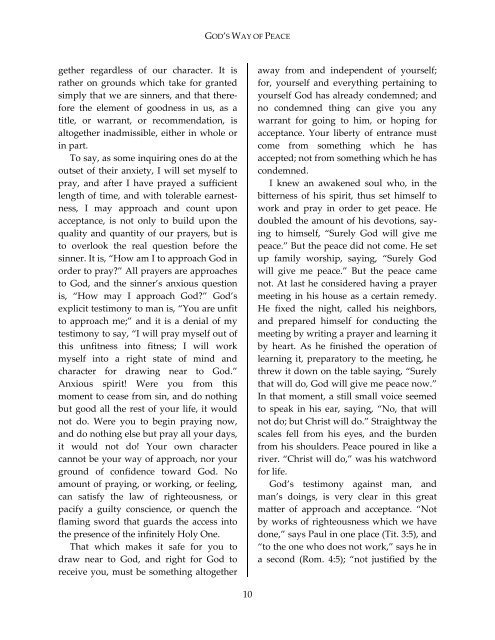God's Way of Peace by Horatius Bonar, D.D.
The seasoned Scottish pastor wrote this short devotional for those suffering from guilt, anxiety, or the consequences of sin. He writes with neither chastisement nor condemnation, but rather immediately directs his readers to Christ’s gift of salvation through his death and resurrection. Bonar reminds all that the Gospel offers hope for the sinner and comfort for the troubled, for God’s perfect, constant grace never fails those who accept it. From Bonar’s time to the present, people have found peace with God afresh through this book. Many people report having read it several times, and turning to it again and again when troubles arise. Kathleen O’Bannon CCEL Staff
The seasoned Scottish pastor wrote this short devotional for those suffering from guilt, anxiety, or the consequences of sin. He writes with neither chastisement nor condemnation, but rather immediately directs his readers to Christ’s gift of salvation through his death and resurrection. Bonar reminds all that the Gospel offers hope for the sinner and comfort for the troubled, for God’s perfect, constant grace never fails those who accept it. From Bonar’s time to the present, people have found peace with God afresh through this book. Many people report having read it several times, and turning to it again and again when troubles arise.
Kathleen O’Bannon
CCEL Staff
You also want an ePaper? Increase the reach of your titles
YUMPU automatically turns print PDFs into web optimized ePapers that Google loves.
GOD’S WAY OF PEACE<br />
gether regardless <strong>of</strong> our character. It is<br />
rather on grounds which take for granted<br />
simply that we are sinners, and that therefore<br />
the element <strong>of</strong> goodness in us, as a<br />
title, or warrant, or recommendation, is<br />
altogether inadmissible, either in whole or<br />
in part.<br />
To say, as some inquiring ones do at the<br />
outset <strong>of</strong> their anxiety, I will set myself to<br />
pray, and after I have prayed a sufficient<br />
length <strong>of</strong> time, and with tolerable earnestness,<br />
I may approach and count upon<br />
acceptance, is not only to build upon the<br />
quality and quantity <strong>of</strong> our prayers, but is<br />
to overlook the real question before the<br />
sinner. It is, “How am I to approach God in<br />
order to pray?” All prayers are approaches<br />
to God, and the sinner’s anxious question<br />
is, “How may I approach God?” God’s<br />
explicit testimony to man is, “You are unfit<br />
to approach me;” and it is a denial <strong>of</strong> my<br />
testimony to say, “I will pray myself out <strong>of</strong><br />
this unfitness into fitness; I will work<br />
myself into a right state <strong>of</strong> mind and<br />
character for drawing near to God.”<br />
Anxious spirit! Were you from this<br />
moment to cease from sin, and do nothing<br />
but good all the rest <strong>of</strong> your life, it would<br />
not do. Were you to begin praying now,<br />
and do nothing else but pray all your days,<br />
it would not do! Your own character<br />
cannot be your way <strong>of</strong> approach, nor your<br />
ground <strong>of</strong> confidence toward God. No<br />
amount <strong>of</strong> praying, or working, or feeling,<br />
can satisfy the law <strong>of</strong> righteousness, or<br />
pacify a guilty conscience, or quench the<br />
flaming sword that guards the access into<br />
the presence <strong>of</strong> the infinitely Holy One.<br />
That which makes it safe for you to<br />
draw near to God, and right for God to<br />
receive you, must be something altogether<br />
away from and independent <strong>of</strong> yourself;<br />
for, yourself and everything pertaining to<br />
yourself God has already condemned; and<br />
no condemned thing can give you any<br />
warrant for going to him, or hoping for<br />
acceptance. Your liberty <strong>of</strong> entrance must<br />
come from something which he has<br />
accepted; not from something which he has<br />
condemned.<br />
I knew an awakened soul who, in the<br />
bitterness <strong>of</strong> his spirit, thus set himself to<br />
work and pray in order to get peace. He<br />
doubled the amount <strong>of</strong> his devotions, saying<br />
to himself, “Surely God will give me<br />
peace.” But the peace did not come. He set<br />
up family worship, saying, “Surely God<br />
will give me peace.” But the peace came<br />
not. At last he considered having a prayer<br />
meeting in his house as a certain remedy.<br />
He fixed the night, called his neighbors,<br />
and prepared himself for conducting the<br />
meeting <strong>by</strong> writing a prayer and learning it<br />
<strong>by</strong> heart. As he finished the operation <strong>of</strong><br />
learning it, preparatory to the meeting, he<br />
threw it down on the table saying, “Surely<br />
that will do, God will give me peace now.”<br />
In that moment, a still small voice seemed<br />
to speak in his ear, saying, “No, that will<br />
not do; but Christ will do.” Straightway the<br />
scales fell from his eyes, and the burden<br />
from his shoulders. <strong>Peace</strong> poured in like a<br />
river. “Christ will do,” was his watchword<br />
for life.<br />
God’s testimony against man, and<br />
man’s doings, is very clear in this great<br />
matter <strong>of</strong> approach and acceptance. “Not<br />
<strong>by</strong> works <strong>of</strong> righteousness which we have<br />
done,” says Paul in one place (Tit. 3:5), and<br />
“to the one who does not work,” says he in<br />
a second (Rom. 4:5); “not justified <strong>by</strong> the<br />
10

















